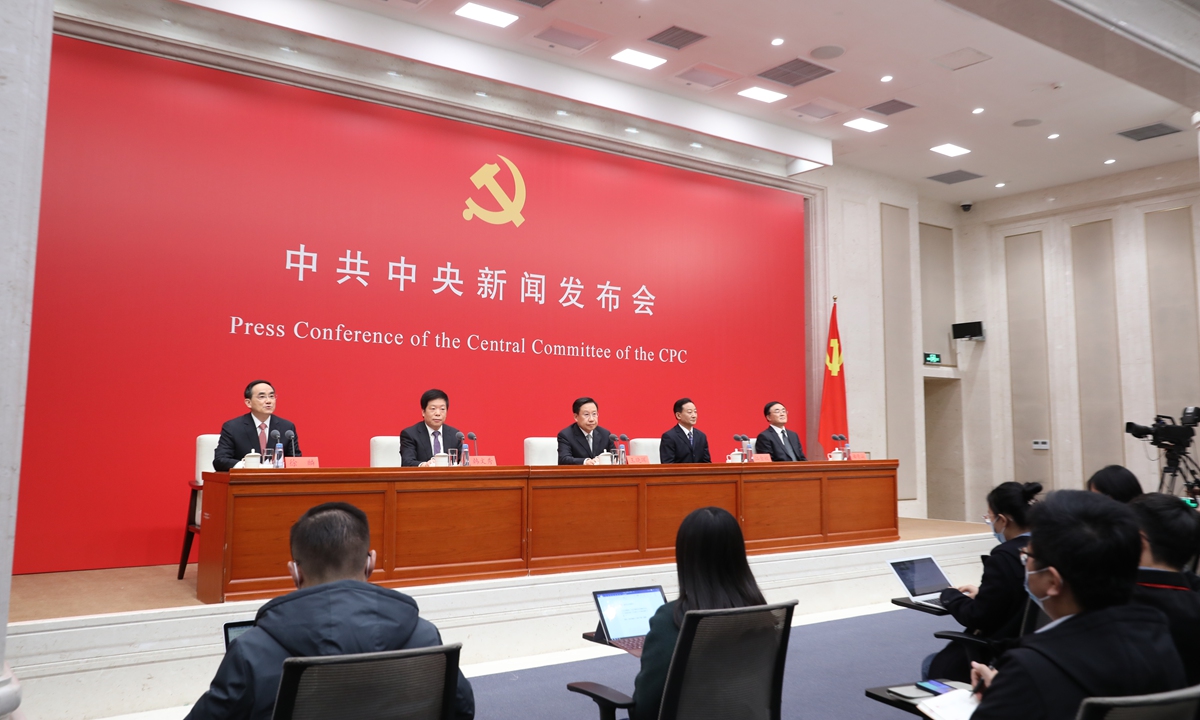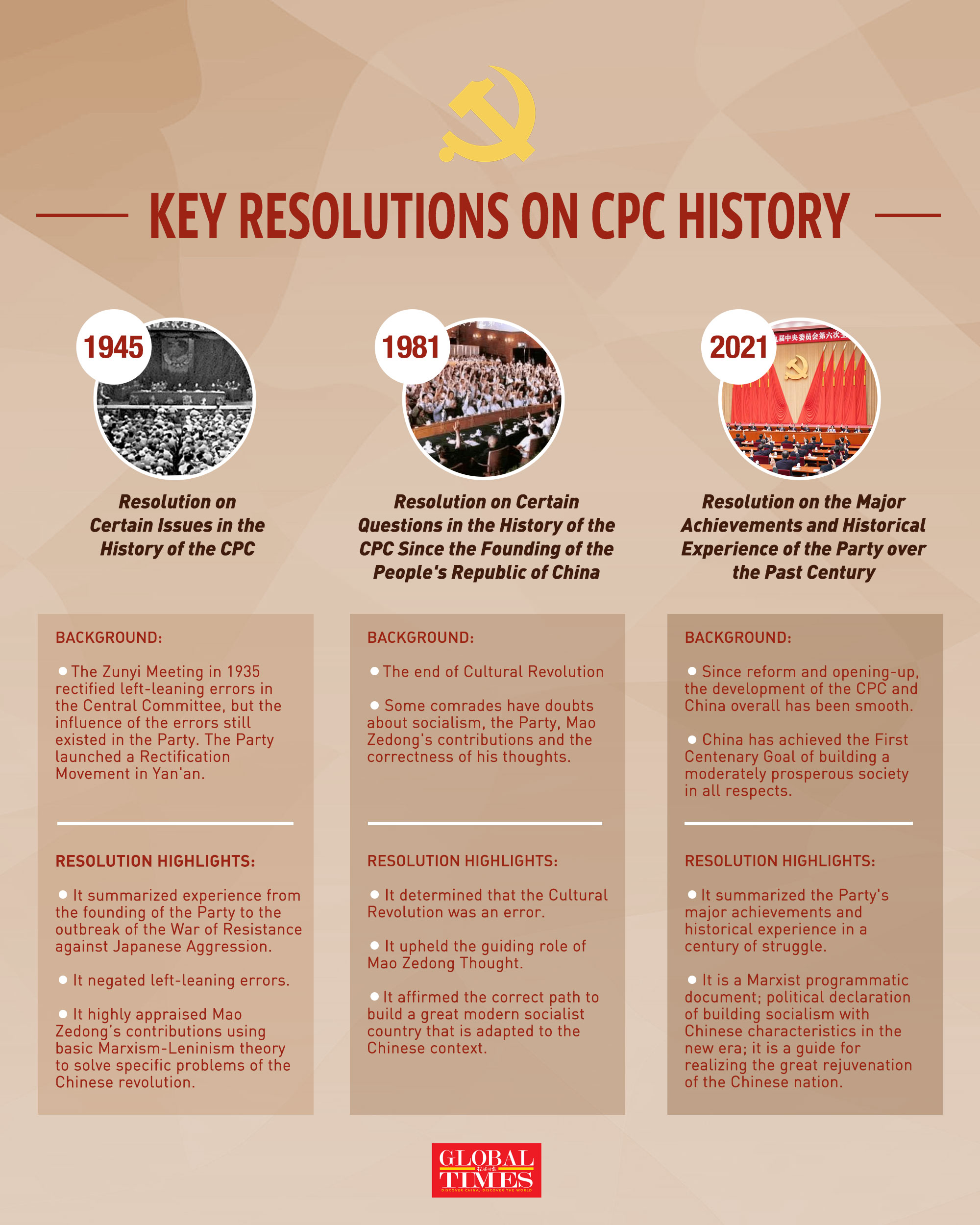
The 19th CPC Central Committee holds a press conference to discuss the just concluded sixth plenary session on November 12, 2021 in Beijing. Photo: VCG
A landmark resolution on the Communist Party of China's (CPC) centennial achievements and historical experience, which was adopted at the sixth plenum of the 19th CPC Central Committee, has become the third of its kind in CPC history but with an unprecedented vision.
The previous two resolutions showed the Party's struggles and efforts to correct left-leaning mistakes. Observers pointed out that the newly adopted resolution reflects CPC's unprecedented confidence in its path and capabilities to lead the future journey based on valuable historical experience.
The three historical resolutions jointly manifested important characteristics of the CPC - being good at summarizing experience in history, bearing a strong spirit of self-rectification and self-revolution, seeking truth out of facts, and sticking to sinicization of Marxism through practices, observers said.
Zheng Yongnian, a prestigious political scientist, said taking history as a mirror is part of Chinese civilization. Denying many people's Utopian dream of a system that can solve all problems, Zheng said every country and region should start from their own history to find a development path.
The most significant fruit of the sixth plenary session of 19th CPC Central Committee is the adoption of The Resolution on the Major Achievements and Historical Experience of the Party over the Past Century, 76 years after The Resolution on Certain Issues in the History of the CPC (1945), and 40 years after The Resolution on Certain Questions in the History of the CPC Since the Founding of the People's Republic of China (1981).

In the CPC's history, two resolutions focused on studying historical questions like the Cultural Revolution. The 3rd landmark resolution, adopted at Sixth Plenary Session of the 19th CPC Central Committee, summarizes the Party's achievements and experience over the past century. Graphic: GT
The first resolution summarized experiences from the founding of the Party to the outbreak of the War of Resistance against Japanese Aggression, covering several left-leaning mistakes the Party made and paving the way to confirm Mao Zedong Thought's crucial role in leading China to the success of a new-democratic revolution and the founding of PRC.
The second resolution fundamentally denied the Cultural Revolution and its erroneous left-leaning ideals, but also successfully sought not to deny Mao and Mao Zedong Thought, and confirmed the guiding role of Mao Zedong Thought for the CPC, avoiding the internal turbulence the Soviet Union faced.
The previous two resolutions were made at key historical junctures of the Party and the nation, addressing major problems on rights and wrongs and answering the question of what kind of a path the CPC and China should adopt, Yang Xuedong, a professor of political science at Tsinghua University, told the Global Times on Friday.
The conclusions and narratives of the previous two resolutions are still applicable today. And since the reform and opening-up, the cause of the Party and the nation, despite some challenges, is smooth, the direction is correct, and the achievements are widely acknowledged, according to a Friday press conference on the just concluded plenum.
Qu Qingshan, head of the Institute of Party History and Literature of the CPC Central Committee, told the Friday press conference that the third resolution was adopted at a time when the Party passed a 100-year journey, led the people and fulfilled the First Centenary Goal of building a moderately prosperous society in all respects, and embarked on the new journey to achieve the Second Centenary Goal of building a modern socialist country.
The third resolution gave extensive sessions to the innovative thoughts, experimental practices and breakthroughs since the 18th National Congress of the CPC, which is conducive to leading the Party and the people to solidify confidence and focus on our missions.
Qu said at the press conference that the resolution fully demonstrated the Party's political wisdom and responsibility, as well as its high historical awareness and self-confidence.
Yang said the third landmark resolution, in a very positive tone, showed the CPC has found a suitable path and is confident to continue to lead on ambitious future goals including common prosperity and the great journey of national rejuvenation.
Zhang Xixian, a professor at the Party School of the Central Committee of the CPC, told the Global Times that the third resolution has an unprecedented vision as it has a longer-than-ever centennial scope to summarize achievements and experience.
Standing at a strategic and commanding position, the resolution consolidated the spiritual fruits of the Party which will be a treasure for The Second Centennial Goal, Zhang said
He was referring to the establishment of Comrade Xi Jinping's core position in the CPC Central Committee and in the Party as a whole, and the guiding role of Xi Jinping Thought on Socialism with Chinese Characteristics for a New Era.
Since the Communist Manifesto, world exploration on Marxism has always been a path filled with challenges and frustration. But China under CPC leadership can present a brilliant answer sheet, with socialist spirit, experience and systems as part of it, Zhang said, noting that's also the CPC and China's contribution to the international Communist cause.
Just like Qu said at the press conference, the resolution is a guiding piece of literature of Marxism, a political declaration the CPC members made to bear in mind the Party's founding mission and uphold and develop socialism with Chinese characteristics, as well as an action guide for achieving the great rejuvenation of the Chinese nation.





